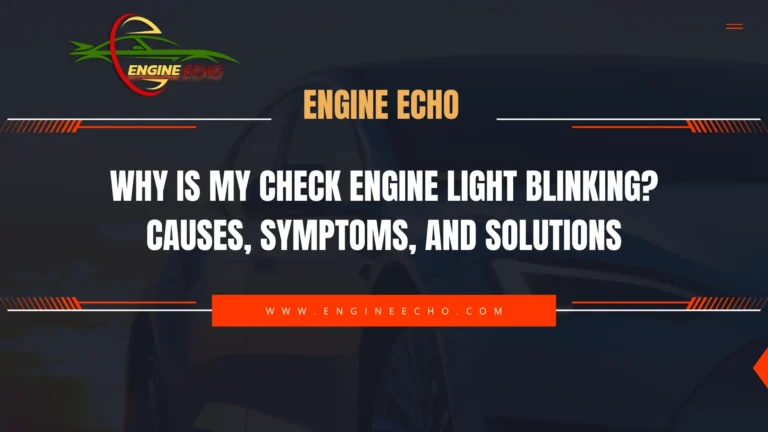Blinking Engine Light: What It Indicates

Key Takeaways
- If your engine light starts blinking, trust me, it’s not something to ignore.
- Ignoring the light can lead to serious engine damage and expensive repairs down the road.
- The usual culprits include engine misfires, bad spark plugs, or a damaged catalytic converter.
- A quick scan with an OBD-II tool can help you figure out the problem.
- Knowing when to DIY and when to visit a mechanic can save you a lot of stress and money.
Introduction
I’ve been there – that moment when your engine light starts blinking, and you think, “It’s probably nothing.” Spoiler alert: it’s definitely something. From personal experience, the blinking engine light is not something you want to brush off. It signals a serious issue that can quickly turn into a costly nightmare if ignored. I’m writing this because I’ve made that mistake before, and trust me, it’s a lesson you don’t want to learn the hard way. Let me walk you through what a blinking engine light really means and how you can handle it without losing sleep (or a chunk of cash).
Immediate Actions to Take
When You First Notice the Light Blinking
Picture this: you’re driving along, everything seems fine, and then suddenly that light starts blinking. Don’t panic, but don’t ignore it either. I’ve learned the hard way that pulling over sooner rather than later is the best move.
- Reduce speed safely: Seriously, take it from me – driving fast with a blinking engine light is like running a marathon with a sprained ankle. It’s only gonna end badly.
- Check for other signs: Are there strange noises? Weird smells? If something seems off, it’s time to stop and call for help.
Do’s and Don’ts
- Do’s:
- Pull over safely as soon as you can.
- If you’re near a repair shop, head there slowly – but don’t push it.
- Don’ts:
- Don’t assume it’s a minor issue just because your car seems fine.
- Don’t rev the engine or keep driving long distances. This could turn a fixable problem into an expensive one.
Common Reasons for a Blinking Engine Light
Let me tell you, in most cases, a blinking engine light means your engine is misfiring. I’ve had this happen on a road trip before, and it’s no fun. Here’s what might be causing it:
Misfiring Engine
A misfire happens when one or more of your engine’s cylinders isn’t firing properly. It disrupts the combustion process and can lead to rough running or power loss. I’ve had this issue pop up before, and believe me, pulling over was the right call.
Faulty Spark Plugs or Ignition Coils
Spark plugs are small, but they’re the unsung heroes of your engine. When they’re worn out, your engine can’t fire correctly, leading to a misfire.
- Signs: Rough idling, slow acceleration, or struggling to start the car.
- Fix: If you haven’t already, check and replace your spark plugs. I replace mine regularly, and it’s saved me from bigger problems down the line.
Catalytic Converter Damage
This one’s a biggie. If your engine misfires for too long, unburned fuel can damage the catalytic converter. And trust me, replacing a catalytic converter isn’t cheap – I’ve been there.
- Signs: A rotten egg smell from your exhaust or lower fuel efficiency.
- Fix: Preventative maintenance is key. Keep your engine running smoothly, and you won’t have to deal with this headache.
Fuel Delivery Issues
A bad fuel injector or fuel filter can cause the engine to misfire and set off that blinking light. I’ve found that using better-quality fuel helps avoid some of these problems.
- Signs: Stalling, rough acceleration, or difficulty starting.
- Fix: Check the fuel system if you’re having repeated misfire issues.
Faulty Sensors
Sensors can be sneaky troublemakers. A bad oxygen sensor or mass airflow sensor can mess with your fuel-air mix, leading to misfires.
- Oxygen Sensor: Helps optimize fuel efficiency by monitoring oxygen levels in your exhaust.
- Mass Airflow Sensor: Measures the amount of air coming into the engine. If it’s faulty, the engine won’t get the right mix, which can cause the blinking light.
Severity of the Issue
Minor vs. Major Problems
While a solid engine light might just mean a loose gas cap or a minor emissions issue, a blinking light is a whole different story. It means something critical is going on, like a misfire or catalytic converter issue, and you need to act fast.
What Happens If You Ignore a Blinking Engine Light?
Here’s where I’ve learned my lesson: ignoring a blinking engine light can lead to some serious (and expensive) damage. Once, I thought I could ignore it for a while, and I ended up with a failed catalytic converter. That repair cost me over $1,500. Don’t make the same mistake I did!
How to Diagnose the Problem
Using an OBD-II Scanner
Honestly, getting an OBD-II scanner was a game-changer for me. You just plug it in, and it’ll give you a diagnostic code that helps you figure out what’s wrong. It’s saved me a trip to the mechanic more than once.
Common Diagnostic Codes Related to Blinking Engine Lights
Here are a few codes I’ve run into myself:
- P0300: Random or multiple cylinder misfire.
- P0301-P0308: Misfire in specific cylinders.
- P0420: Catalytic converter efficiency issue.
When to Seek Professional Help
As much as I love tackling DIY fixes, I know when it’s time to call a mechanic. If you’re unsure or the issue seems big (like catalytic converter damage), it’s better to get professional help.
The Difference Between Blinking and Solid Engine Lights
Solid Engine Light
A solid check engine light usually means something less urgent, like a loose gas cap. I’ve driven with one before, and while you still need to get it checked, you don’t have to pull over immediately.
Blinking Engine Light
When the light starts blinking, though, it’s a whole different ballgame. Blinking means there’s something serious going on, and you should stop driving as soon as you can.
Engine Misfires: A Deeper Look
What is an Engine Misfire?
An engine misfire happens when one or more cylinders fail to ignite the fuel properly. You’ll notice your car running rough, and if you don’t take care of it, it can cause serious damage.
How Misfires Affect the Catalytic Converter
Misfires send unburned fuel into the exhaust system, which can damage the catalytic converter. Trust me, replacing one is expensive. It’s much easier to catch the problem early and avoid this mess altogether.
DIY Fixes vs. Professional Repairs
Common DIY Fixes
I’ve fixed my car’s spark plugs and sensors more than a few times. If you’re comfortable with basic car maintenance, these fixes can save you money and hassle.
When Professional Help is Essential
But sometimes, it’s just not worth the risk to DIY. If your car’s still misfiring after you’ve replaced spark plugs, or you suspect the catalytic converter’s damaged, call a professional. I’ve learned that some things are better left to the experts.
Preventative Measures to Avoid a Blinking Engine Light
Regular Maintenance
I can’t stress this enough – regular maintenance is the best way to avoid issues. I always make sure to replace spark plugs and check sensors during routine service. It’s kept me out of trouble more than once.
Fuel Quality
Using good-quality fuel goes a long way in preventing misfires. I always use premium fuel, and it’s helped my car run smoother and avoid problems.
How Often Should You Check the Engine?
I check mine every few months, and I highly recommend it. Catching problems early is a lot cheaper than waiting for something to go wrong.
Case Studies
Case Study 1: Misfire Due to Spark Plug Issues
Once, my car started running rough, and the engine light was blinking. Turned out it was just a bad spark plug. I replaced it myself, and the problem was solved without any drama.
Case Study 2: Catalytic Converter Damage
This one’s a lesson I learned the hard way. I ignored the blinking light for too long, and it damaged my catalytic converter. That repair cost me over $1,500. If I’d handled the misfire right away, I could’ve avoided that bill.
Case Study 3: Ignoring the Blinking Light
I had a friend who ignored a blinking engine light for weeks. By the time they took it in, the engine had failed completely, and they had to rebuild it. Don’t let it get that far!
Conclusion
Take it from someone who’s been there: a blinking engine light is not something to ignore. It’s your car’s way of telling you something is seriously wrong, and the sooner you act, the better. I’ve ignored it before, and it cost me big – so I’m telling you, don’t make the same mistake. A little preventative action now can save you a lot of money and stress down the road.
Frequently Asked Questions (FAQs)
Can I drive with a blinking engine light?
Nope, it’s not safe to keep driving when the engine light is blinking. It’s a sign of a serious issue that could damage your car if you don’t address it.
How much does it cost to fix engine misfires?
It depends. Simple fixes like spark plugs might run you $100-$300, but if it’s a catalytic converter issue, you could be looking at over $1,000.
Will bad fuel cause the engine light to blink?
Yes, poor-quality fuel can lead to misfires, which could cause the engine light to blink. That’s why I always use premium fuel.
How can I check if the problem is serious?
Use an OBD-II scanner to get the diagnostic code. It’ll help you figure out if it’s something you can handle or if you need a mechanic.
Is it safe to DIY a repair when the engine light is blinking?
If it’s something simple like spark plugs, sure. But if it’s a bigger issue, like a catalytic converter or persistent misfires, I’d recommend seeing a mechanic.
Thanks for checking out this article on EngineEcho.com! Hope you found this article: "Blinking Engine Light: What It Indicates" helpful! If you liked it and want to dive into more car engine topics, head over to our homepage. There's always something new to discover in the world of engines. Enjoy your reading journey!
Check out our previous article: Essential Parts for Your Engine






